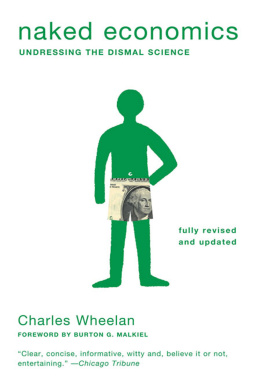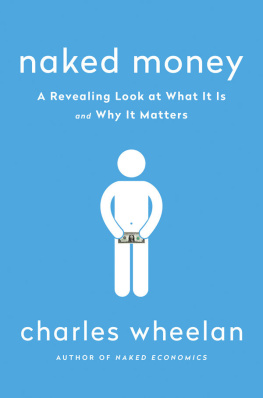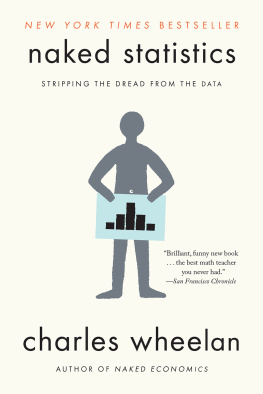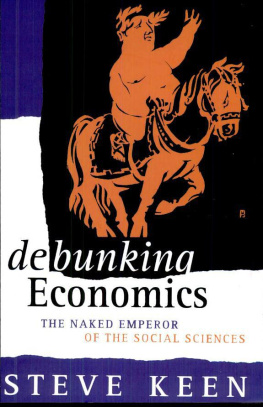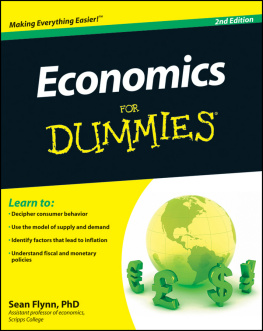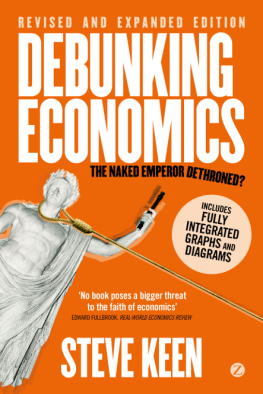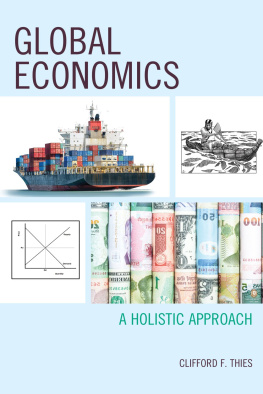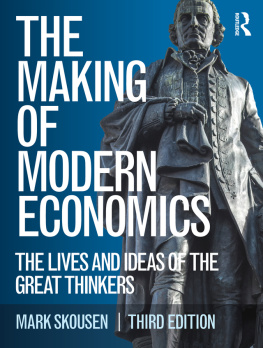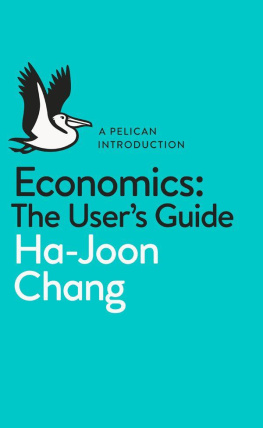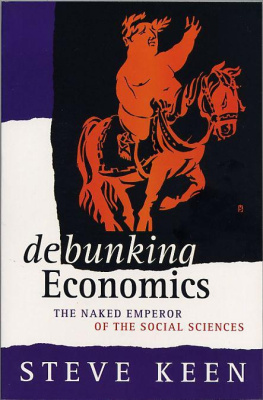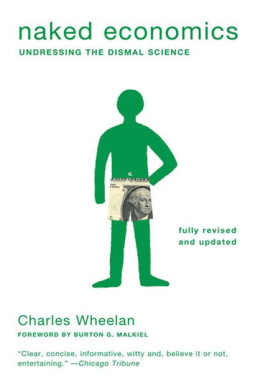More praise for
naked economics
by Charles Wheelan
I recommend this book to anyone who wants to gain an understanding of basic economics with little pain and much pleasure.
Gary Becker, 1992 Nobel Prize winner in Economics
I devoured Naked Economics whole, start to finish. Finally an economist was speaking my language! Finally I could grasp not only the meanings of all those acronyms I only pretended to understand, but how the institutions and concepts for which they stand mightand doimpact my life. Bravo, Charles Wheelan, for doing the impossible: making the study of economics fascinating, comprehensible, and laugh-out-loud funny.
Deborah Copaken Kogan, author of Shutterbabe: Adventures in Love and War
From simple supply and demand to the much more frightening subject of monetary policy, this book manages to explain our global economy in a way that is (gasp!) actually entertaining.
Book Magazine
Translates the arcane and often inscrutable jargon of the professional economist into language accessible to the inquiring but frustrated layman. Clear, concise, informative, [and] witty.
Chicago Tribune
In just a few easy lessons,Wheelan can teach the most innocent reader to think like an economist.
Kirkus Reviews
Makes economics accessible, comprehensible and appealing. Wheelans simplicity does not mask the detailed encapsulation of complicated issues, such as relative wealth, globalization and the importance of human capital. He smartly shows that while economic consequences can be global, they are also a part of everyday life.
Publishers Weekly
naked economics
Undressing the Dismal Science
fully revised and updated
CHARLES WHEELAN
Foreword by Burton G. Malkiel

W. W. Norton & Company
New York London
Copyright 2010, 2002 by Charles Wheelan
Foreword copyright 2002 by Burton G. Malkiel
All rights reserved
Mums the Word reprinted with permission. Further reproduction prohibited. 1998 The Economist Newspaper Group, Inc. www.economist.com.
Two Cheers for Sweatshops, Hearts and Heads, and I Love D.C. reprinted with permission of the New York Times .
For information about permission to reproduce selections from this book, write to Permissions, W. W. Norton & Company, Inc., 500 Fifth Avenue, New York, NY 10110
Library of Congress has catalogued an earlier edition as follows:
Wheelan, Charles J.
Naked economics: undressing the dismal science/Charles Wheelan; foreword by Burton G. Malkiel.Fully rev. and updated.
p. cm.
Includes bibliographical references.
ISBN: 978-0-393-07975-3
1. Economics. I. Title.
HB171.W54 2010
330dc22
2009052148
W. W. Norton & Company, Inc.
500 Fifth Avenue, New York, N.Y. 10110
www.wwnorton.com
W. W. Norton & Company Ltd.
Castle House, 75/76 Wells Street, London W1T 3QT
For Leah
Contents
by Burton G. Malkiel
Epilogue
Life in 2050: Seven Questions
Foreword
by Burton G. Malkiel
I t is widely believed that Scotsman Thomas Carlyle labeled economics the dismal science well over one hundred years ago because it seemed boring, uninteresting, unclear, and full of on the one hand, on the other hand. Indeed, Harry Truman is reported to have said that to avoid ambiguity, he wanted to have one-armed economists. In fact, Carlyle had something very different in mind. What Carlyle reminded us was that scarcity was pervasivethat we have to make choices between competing satisfactions, between jam today and jam tomorrow, and between conflicting values and goals. Above all, the dour Scot emphasized that everything has a cost and nothing can be produced without work and sacrifice.
To be sure, many people do believe that economics and economists are dismal in the popular sense, that is, extraordinarily dull. As one definition goes: An economist is someone who is good with numbers but does not have the personality to be an accountant. The tarnished image of economists is in large part earned by their tendency to opaque writing, their use of often inscrutable diagrams, and their excessive use of mathematics. Moreover, they often fail to admit what they dont know.
Why is economics the butt of so many jokes, and why do students often become glassy-eyed when confronted with the study of economics as a discipline? The reasons, I think, are that economists generally do not write well and that most economics texts rely far too much on algebraic manipulation and complex diagrams. Moreover, few economists are able to transmit the considerable excitement of economic analysis or to show its relevance to everyday life. This book by Charles Wheelan changes all that. Wheelan has an anti-Midas touch. If he touched gold he would turn it to life.
This is a truly unique book. It contains no equations, no inaccessible jargon, and no inscrutable diagrams. While equations and diagrams may well be behind many of the ideas in economics, Wheelan shows that they can be reduced to plain English. He boils economics down to its essentials. He demonstrates that the term lucid economist is not an oxymoron.
In these pages, we see how many of the criticisms of economists are undeserved. Economic analysis is a hard and complex subjectin many cases far more complex than analysis in the physical sciences. Physics can elegantly explain simple contained systems such as the planets revolving around the sun or electrons in orbit around an atom. But even the physical sciences have difficulty understanding phenomena in nature. Weather forecasting is a case in point. Despite complex satellite observations and intricate weather forecasting models, meteorologists often cannot improve on very naive forecasting models such as The weather tomorrow will be exactly like it is today. To be sure, the inertia model misses all the turning points but retains an excellent overall record. And when forecasters are asked to make longer-run projections on such subjects as global warming, their range of forecasts makes economic forecasts appear precise by comparison.
Economics is more difficult than the physical sciences because we cannot usually run controlled laboratory experiments and because people do not always behave predictably. A whole new branch of behavioral economics has attracted considerable attention by combining the insights of psychologists and economists, but we still are unable to predict individual behavior with any precision. But that we are far from understanding everything does not mean that we understand nothing. We do know that individual behavior is strongly influenced by incentives. We do know that there are many logical regularities, and we have enjoyed a steady accumulation of knowledge. We do know that every sale involves a purchase and that obvious opportunities for profit are rarely overlookedthe basic idea behind the theory that our securities markets are remarkably efficient.
And as inexact as economic science may be, it has a direct impact on our lives and it has a critical role to play in government policymaking. Economists influence all branches of government. The tasks of promoting economic growth and high employment while avoiding inflation have long been recognized as the domain of government economists. Remember Bill Clintons most successful campaign slogan during the 1992 election? Its the economy, stupid! Promoting competition and restraining monopolies (Justice Department), limiting pollution (Environmental Protection Agency), and providing medical care (Health and Human Services) are examples of major activities within different cabinet departments that have crucially important economic components. Indeed, it is hard to think of any political decisions, be they on social, tax and expenditure, international, agricultural, or national security issues, that do not have economic consequences. And however skeptical politicians may be about the ability of economists to solve these problems, the economists advice is not ignored. Indeed, as John Maynard Keynes once wrote, Practical men, who believe themselves to be quite exempt from any intellectual influence, are usually the slaves of some defunct economist. Madmen in authority, who hear voices in the air, are distilling their frenzy from some academic scribbler of a few years back.

